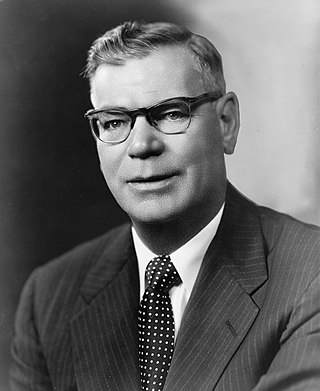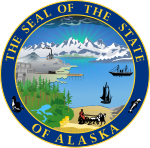
Edward Lewis "Bob" Bartlett, was an American politician and a member of the Democratic Party. He served as a U.S. Senator. A key fighter for Alaska statehood, Bartlett served as the Secretary of Alaska Territory from 1939 to 1945, in Congress from 1945 to 1959 as a Delegate, and from 1959 until his death in 1968 as a U.S. senator. He was opposed to U.S. involvement in Vietnam, along with his fellow Senator Ernest Gruening, and also worked to warn people about the dangers of radiation. Many acts bear his name, including a major law known as the Bartlett Act, mandating handicap access in all federally-funded buildings.

The 1998 United States Senate elections were held on November 3, with the 34 seats of Class 3 contested in regular elections. This was seen as an even contest between the Republican Party and Democratic Party. While the Democrats had to defend more seats up for election, Republican attacks on the morality of President Bill Clinton failed to connect with voters and anticipated Republican gains did not materialize. The Republicans picked up open seats in Ohio and Kentucky and narrowly defeated Democratic incumbent Carol Moseley Braun, but these were cancelled out by the Democrats' gain of an open seat in Indiana and defeats of Republican Senators Al D'Amato and Lauch Faircloth. The balance of the Senate remained unchanged at 55–45 in favor of the Republicans.

The 1986 United States Senate elections were elections for the United States Senate. Held on November 4, in the middle of Ronald Reagan's second presidential term, the 34 seats of Class 3 were contested in regular elections. The Republicans had to defend an unusually large number of freshman Senate incumbents who had been elected on President Ronald Reagan's coattails in 1980. Democrats won a net of eight seats, defeating seven freshman incumbents, picking up two Republican-held open seats, and regaining control of the Senate for the first time since January 1981. This remains the most recent midterm election cycle in which the sitting president's party suffered net losses while still flipping a Senate seat.

The 1984 United States Senate elections were held on November 6, with the 33 seats of Class 2 contested in regular elections. They coincided with the landslide re-election of President Ronald Reagan in the presidential election. In spite of the lopsided presidential race, Reagan's Republican Party suffered a net loss of two Senate seats to the Democrats, although it retained control of the Senate with a reduced 53–47 majority. Democrats defeated incumbents in Illinois and Iowa, and won an open seat in Tennessee, while Republicans defeated an incumbent in Kentucky.

The 1980 United States Senate elections were held on November 4, coinciding with Ronald Reagan's victory in the presidential election. The 34 Senate seats of Class 3 were contested in regular elections. Reagan's large margin of victory over incumbent Jimmy Carter gave a huge boost to Republican Senate candidates, allowing them to flip 12 Democratic seats and win control of the chamber for the first time since the end of the 83rd Congress in January 1955.

The 1974 United States Senate elections were held on November 5, with the 34 seats of Class 3 contested in regular elections. They occurred in the wake of the Watergate scandal, Richard M. Nixon's resignation from the presidency, and Gerald Ford's subsequent pardon of Nixon. Economic issues, specifically inflation and stagnation, were also a factor that contributed to Republican losses. As an immediate result of the November 1974 elections, Democrats made a net gain of three seats from the Republicans, as they defeated Republican incumbents in Colorado and Kentucky and picked up open seats in Florida and Vermont, while Republicans won the open seat in Nevada. Following the elections, at the beginning of the 94th U.S. Congress, the Democratic caucus controlled 60 seats, and the Republican caucus controlled 38 seats.

The 1972 United States Senate elections were held on November 7, with the 33 seats of Class 2 contested in regular elections. They coincided with the landslide re-election of Republican President Richard Nixon. Despite Nixon's landslide victory, Democrats increased their majority by two seats. The Democrats picked up open seats in Kentucky and South Dakota, and defeated four incumbent senators: Gordon Allott of Colorado, J. Caleb Boggs of Delaware, Jack Miller of Iowa, and Margaret Chase Smith of Maine. The Republicans picked up open seats in New Mexico, North Carolina, and Oklahoma, and defeated one incumbent, William B. Spong Jr. of Virginia.

The 1970 United States Senate elections was an election for the United States Senate. It took place on November 3, with the 33 seats of Class 1 contested in regular elections. Special elections were also held to fill vacancies. These races occurred in the middle of Richard Nixon's first term as president. The Democrats lost a net of three seats, while the Republicans and the Conservative Party of New York picked up one net seat each, and former Democrat Harry F. Byrd Jr. was re-elected as an independent.

The 1968 United States Senate elections were elections for the United States Senate. Held on November 5, the 34 seats of Class 3 were contested in regular elections. They coincided with the presidential election of the same year. The Republicans picked up five net seats in the Senate. This saw Republicans win a Senate seat in Florida for the first time since Reconstruction.

The 1960 United States Senate elections coincided with the election of John F. Kennedy as president on November 8, 1960. The 33 seats of Class 2 were contested in regular elections. A special election was also held on June 28, 1960, for a mid-term vacancy in North Dakota where Democrats flipped a seat to expand their majority to 66–34. As Majority Leader Lyndon Johnson was elected Vice President, Mike Mansfield became the new majority leader.

The 1958 United States Senate elections were elections for the United States Senate which occurred in the middle of President Dwight D. Eisenhower's second term. Thirty-two seats of Class 1 were contested in regular elections, the new state of Alaska held its first Senate elections for its Class 2 and 3 seats, and two special elections were held to fill vacancies.

The 1954 United States Senate elections was a midterm election in the first term of Dwight D. Eisenhower's presidency. The 32 Senate seats of Class 2 were contested in regular elections, and six special elections were held to fill vacancies. Eisenhower's Republican party lost a net of two seats to the Democratic opposition. This small change was just enough to give Democrats control of the chamber with the support of an Independent who agreed to caucus with them, he later officially joined the party in April 1955.

The 1980 United States Senate election in Alaska was held on November 4, 1980. Incumbent Democratic United States Senator Mike Gravel ran for a third term in the United States Senate, but lost in the Democratic primary to Clark Gruening, a former state representative who was the grandson of Ernest Gruening, whom Gravel had defeated twelve years prior in an election for the same seat. Gruening later went on to lose the general election to Republican nominee Frank Murkowski, a banker.

Electoral history of Mike Gravel, Speaker of the Alaska House of Representatives (1965–1966), United States Senator from Alaska (1969–1981), candidate for the 1972 Democratic Party Vice Presidential nomination and 2008 Democratic and later Libertarian Presidential nomination

The 1976 United States Senate election in California took place on November 2, 1976. Incumbent Democratic U.S. Senator John V. Tunney ran for re-election to a second term, but was defeated by Republican S. I. Hayakawa. As of 2023, this is the last time an incumbent Democratic Senator from California lost re-election.

The 1968 United States Senate election in Alaska took place on November 5, 1968. Incumbent Democratic U.S. Senator Ernest Gruening ran for a second full term in office but finished behind Speaker of the Alaska House of Representatives Mike Gravel in the Democratic primary. Gruening launched a write-in bid for the seat in the general election, but finished third to Gravel and Republican former Anchorage mayor Elmer Rasmuson.

The 1966 United States Senate election in Alaska was held on November 8, 1966. Incumbent Democratic U.S. Senator Bob Bartlett was re-elected to a third term in office in a landslide, defeating Republican dentist Lee McKinley in a rematch of their 1960 race. Bartlett would not complete the term, dying in office on December 11, 1968, following complications after heart surgery. Ted Stevens would be elected to complete Bartlett's term, and would serve for 40 years in the U.S. Senate. This was the last time until 2008 that a Democrat was elected to Alaska's Class 2 Senate seat.

The 1958 United States Senate elections in Alaska were held November 25, 1958. The elections were held in anticipation of Alaska's admission as the forty-ninth state in the union, effective January 3, 1959. The state held two simultaneous elections to determine their first senators.

The 2018 Alaska gubernatorial election took place on November 6, 2018, to elect the governor and lieutenant governor of Alaska. In the primaries for recognized political parties, candidates for governor and lieutenant governor run separately. The winners of each respective primary for governor and lieutenant governor then become a joint ticket in the general election for their political party. Incumbent Independent governor Bill Walker was seeking re-election in what was originally a three-way race between Walker, Republican former Alaska state senator Mike Dunleavy, and Democratic former Alaska U.S. Senator Mark Begich. Despite Walker dropping out on October 19, 2018 and endorsing Begich, Dunleavy won in what was the only gubernatorial gain by a Republican candidate in 2018. As of 2024, this was the last time the Governor’s office in Alaska changed partisan control. Walker later unsuccessfully ran for Governor of Alaska in 2022.

The November 2022 United States House of Representatives election in Alaska was held on Tuesday, November 8, to elect a member of the United States House of Representatives to represent the state of Alaska. Democratic incumbent Mary Peltola won reelection to a full term in office, defeating Republicans Sarah Palin and Nick Begich III and Libertarian Chris Bye in the runoff count.

























